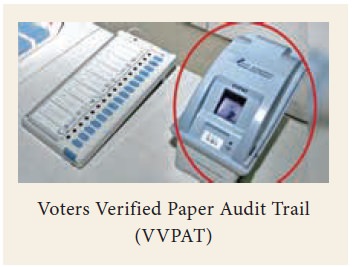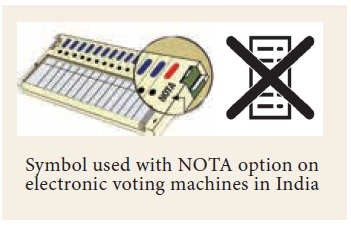Chapter: 9th Social Science : Civics : Election, Political Parties and Pressure Groups
Electoral System in India
Electoral System in India
The electoral system in India has been adapted from
the system followed in the United Kingdom. India is a socialist, secular,
democratic republic and the largest democracy in the world. The modern Indian
nation state came into existence on 15August1947.
I.
Articles 324 to 329 in part XV of the Constitution
make the following provisions with regard to the electoral system in our
country.
II.
Article 324 of the Indian Constitution provides for
an independent Election Commission in order to ensure free and fair elections
in the country. At present, the commission consists of a Chief Election
Commissioner and two Election Commissioners.
III.
The Parliament may make provision with respect to
all matters relating to elections to the Parliament including the preparation
of electoral rolls, the delimitation of constituencies and all other matters
necessary for securing their due constitution.
IV.
The state legislatures can also make provisions
with respect to all matters relating to elections to the state legislatures
including the preparation of electoral rolls and all other matters necessary
for securing their due constitution.
1. Election Process
At the national level, the head of government, the
Prime Minister, is elected by members of the Lok Sabha, the lower house of the
Parliament in India. In representative democracy like ours, elections are
extremely important. Voting in elections are the best way to make your ãvoiceã
heard.

2. Introduction of the NOTA Option
If the people in a democratic country are not
willing to elect any candidate, they can vote for the option called NOTA (None
Of The Above). Rule 49-O in the Conduct of Elections Rules, 1961, of India
describes this procedure

3. Types of Elections in India
Elections are classified into two types: direct and
indirect elections.
Direct Elections
People directly vote for the candidates in the fray
and elect their representatives. The following are examples of direct elections
in which people over the age of 18 years participate in the electoral process
by casting their votes.
ôñ
Lok Sabha elections, in which the Members of
Parliament are elected.
ôñ
Elections to the state Legislative Assemblies, in
which the Members of Legislative Assemblies are elected.
ôñ
Elections to the local governing bodies, in which
members of the local governing bodies like the municipal corporation or the
panchayat are elected.
Merits
ôñ
As the voters elect their representatives directly,
direct elections are considered to be a more democratic method of election.
ôñ
It educates people regarding the government
activities and helps in choosing the appropriate candidates. Also, it
encourages people to play an active role in politics.
ôñ
It empowers people and makes the rulers accountable
for their actions.
Demerits
ôñ
Direct elections are very expensive.
ôñ
Illiterate voters sometimes get misguided by false
propaganda and sometimes campaigning based on caste, religious and various
other sectarian consideration spose serious challenges.
ôñ
Since conducting direct elections is a massive
exercise, ensuring free and fair elections at every polling station is a major
challenge to the Election Commission.
ôñ
There are instances of some political candidates
influencing the voters through payments in the form of cash, goods or services.
ôñ
Election campaigns sometimes results in violence,
tension, law and order problems and affects the day-to-day life of people.
Indirect Elections
Voters elect their representatives, who, in turn,
elect their representatives to formal offices like the Presidentãs office.
Merits
ôñ
Indirect elections are less expensive.
ôñ
It is more suited to elections in large countries.
Demerits
ôñ
If the number of voters is very small, there exists
the possibility of corruption, bribery, horse trading and other unfair
activities.
ôñ
It is less democratic because people do not have a
direct opportunity to elect, but they instead do it through their
representatives. So, this may not reflect the true will of the people.
Related Topics